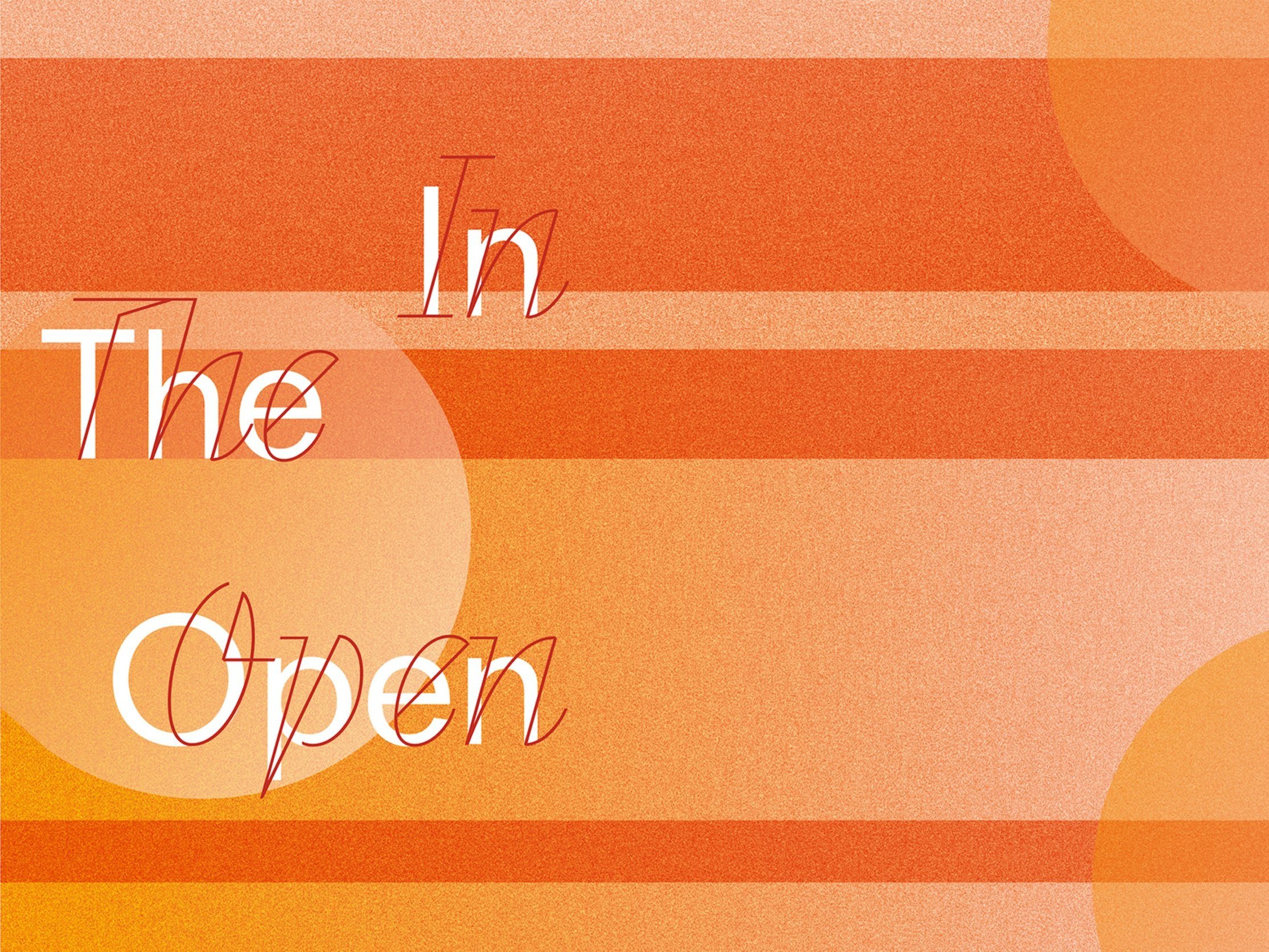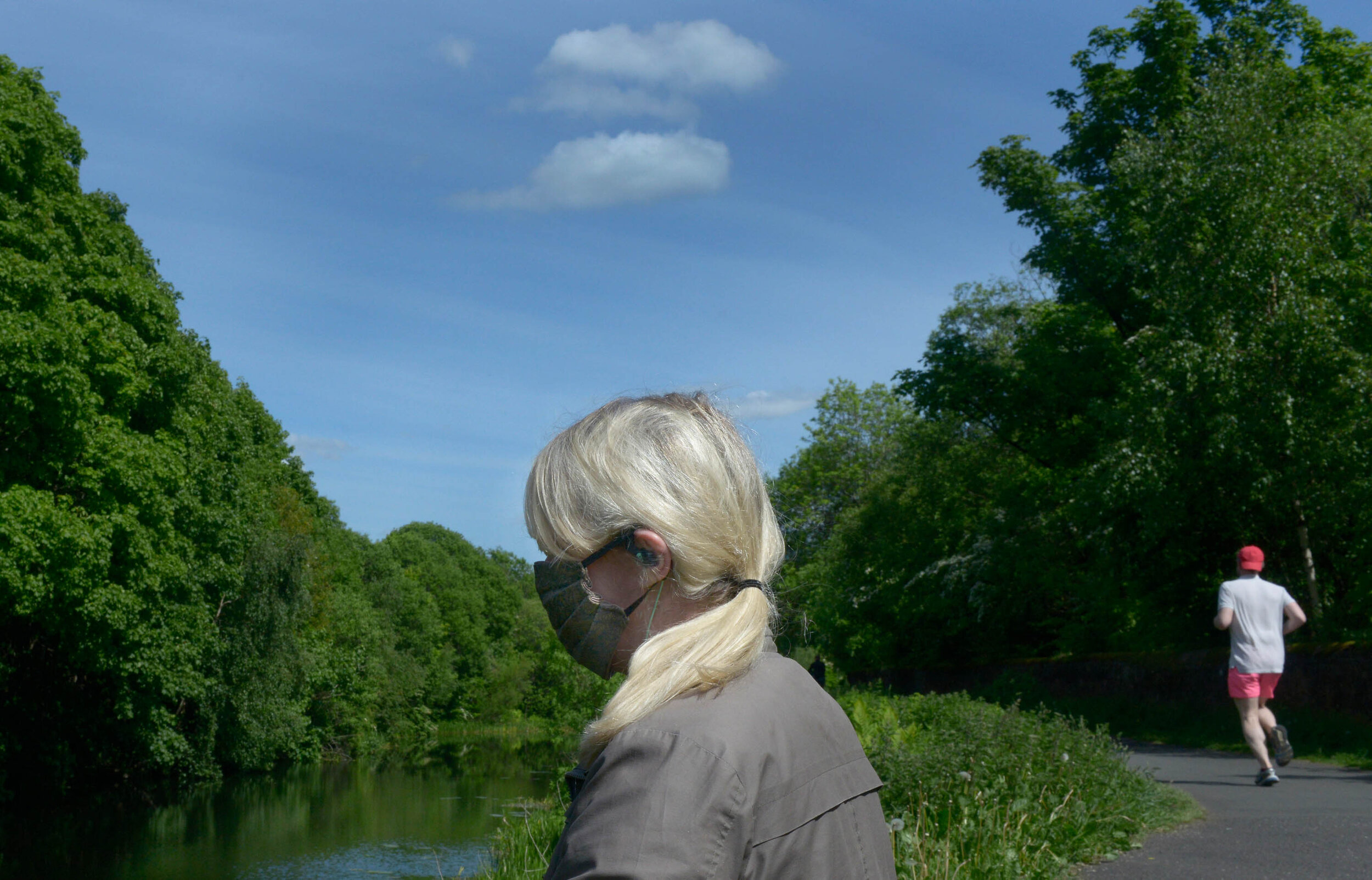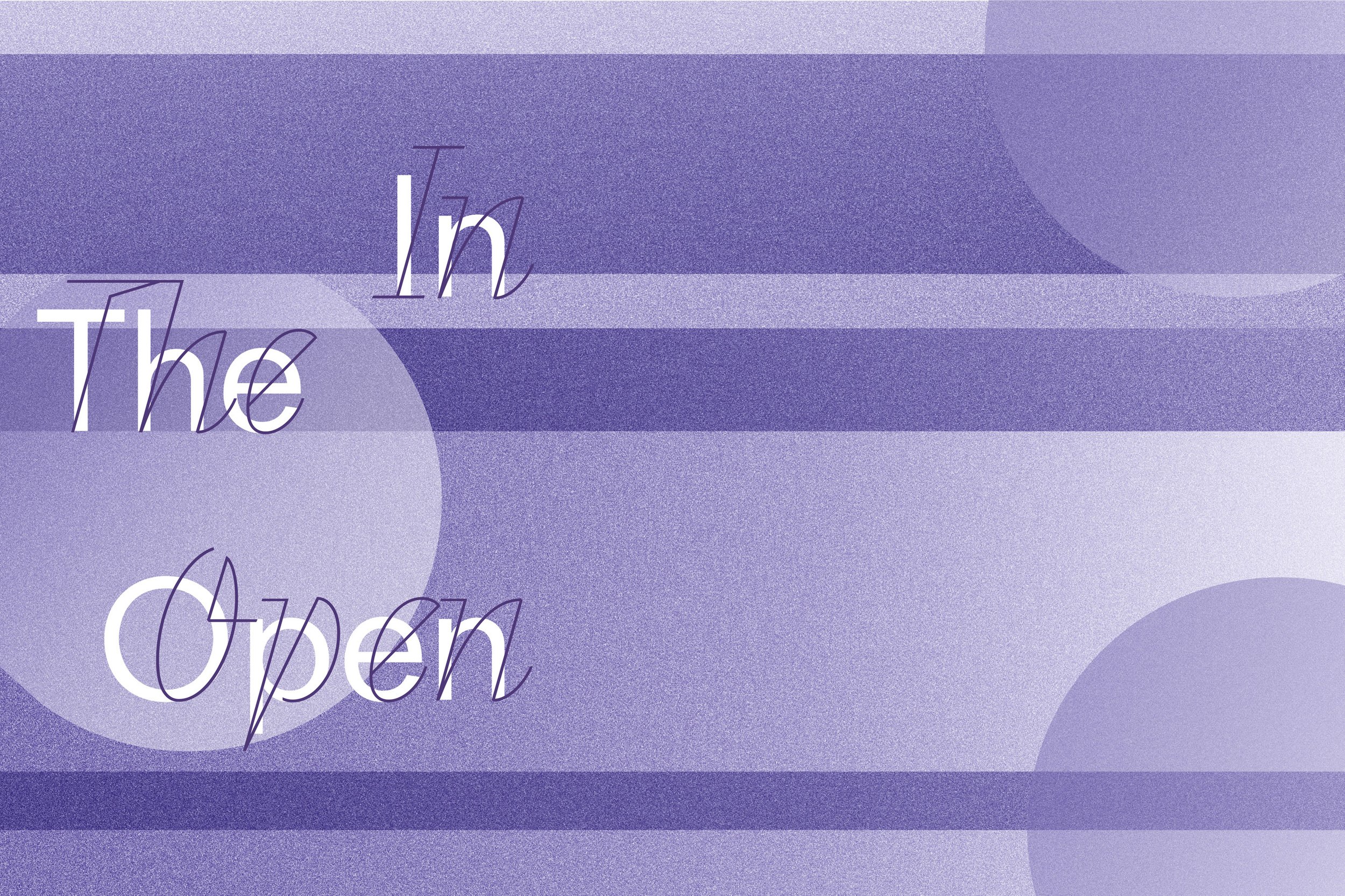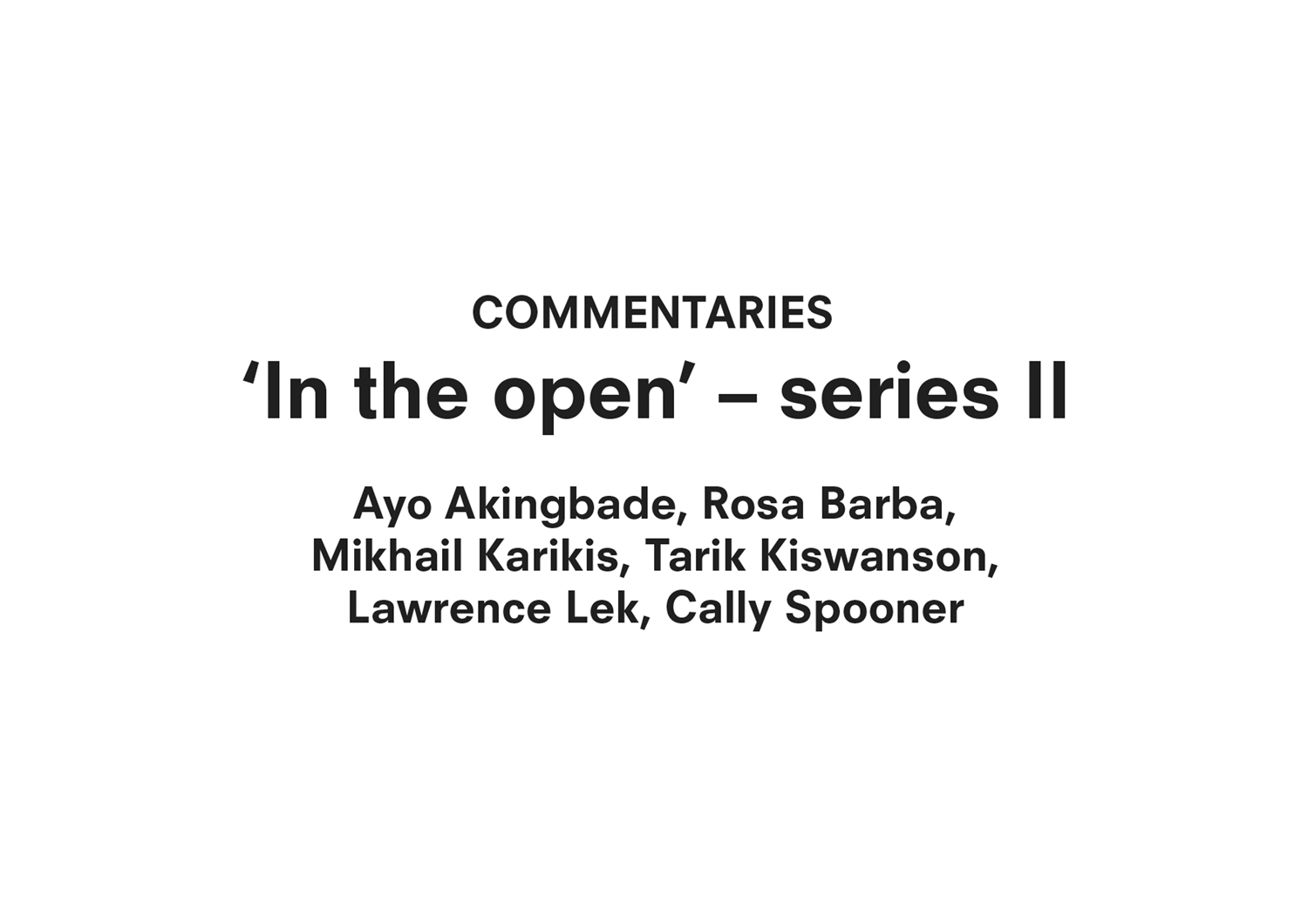
Cally Spooner – 'DEAD TIME: Narrator’s Script’
Design by Maeve Redmond.
Opening with silence, or more accurately with the absence of action, Cally Spooner’s ‘DEAD TIME: Narrator’s Script’ (2019-2021) introduces the listener to an altered sense of time in which no major event nor narrative development takes place. The script is one element drawn from Spooner’s 63-page performance score ‘DEAD TIME’ (2018) which she has been incrementally translating through live performance and installation since composing it in Autumn 2018.
The ‘DEAD TIME’ score is set in “a surveillance-capitalist crime scene” where an absurdist ecosystem of living and non-living characters co-exist in a resistant, pervading present-tense atmosphere; waiting, rehearsing, repeating, yet never quite converging.
The Narrator is both a single male voice and solo piano. Ruminating on faltering immune systems, unstable financial markets, corporate feminism and #MeToo, the Narrator’s composite of pirated language and attenuated silences is met with a regimented bleep-beat and the timed swell of piano repeating the theme tune from a Netflix TV show.
Through this loosely improvisational structure, the reading, like the ‘DEAD TIME’ score as a whole, seeks to hold a space that remains resistant to ‘chrononormativity’ – the imperial, masculinist standardisation of time that orders labour, performance, and digital technologies into a progressive future-orientated linearity.
This particular reading was recorded with a live audience at Camden Arts Centre, London, on the 11th March 2020. In a convergence of events, this took place on the day social distancing was introduced in the UK, setting in motion a collective state of pause.
In her sound edit for The Common Guild, Spooner pivots the listener’s focus towards a very uncomfortable captive audience on the cusp of dramatic societal shift and a year of intermittent captivity. The soundtrack of the room and the audible tension of bodies gathered together brings a palpable clarity to the reading; both staging and activating a state of dead time, testing this as a potential to reset neoliberal temporalities of productivity and liveliness.
Listeners should experience ‘ DEAD TIME’: Narrator’s Script’ whilst walking, working or engaging in other activity. We recommend listening with headphones.
Cally Spooner 'DEAD TIME' (2018) (detail), incomplete partition wall, score of 63 elements (inkjet prints, marker and pen on paper, pencil and ink on technical paper, plastic wallets), 1 x Bose 5 second-generation Virtually Invisible® single cube speaker, audio of non-professional, hastily assembled choir, amplifier, open windows, road outside. 15 metres, 4'33" loop.
Courtesy of the artist and ZERO…, Milan.
Photo: Art Institute of Chicago.
Cally Spooner (1983) lives and works in Turin, Italy. Rooted firmly in her training in philosophy, her practice is generated through writing, unfolds as performance, then lands as film, sound, sculpture, drawings or scores. Her performances incorporate duration and rehearsal as acts of resistance to corporate-digital and performative climates in which it is hard to tell the difference between what is alive and what is dead.
Spooner has a forthcoming solo show at the Fondazione Morra Greco, Naples (2021) and commissions at the Walker Art Centre, Minneapolis and MOCA, Cleveland (both 2021). Her solo shows include 'DEAD TIME', The Art Institute of Chicago (2019); 'SWEAT SHAME ETC.', Swiss Institute New York (2018); 'Everything Might Spill', Castello Di Rivoli, Rivoli (2018); 'DRAG DRAG SOLO', Contemporary Art Centre Geneva (2018); 'Soundtrack For A Troubled Time', Whitechapel Art Gallery (2017); 'On False Tears and Outsourcing', New Museum, New York (2016). ‘On False Tears’, her monograph, was published by Hatje Cantz and Edizione Madre in 2020. Her book 'Scripts' (2016) is published by Slimvolume, and her novel 'Collapsing in Parts' (2012) is published by Mousse Publishing.
Cally Spooner 'DEAD TIME' (2018) (detail), incomplete partition wall, score of 63 elements (inkjet prints, marker and pen on paper, pencil and ink on technical paper, plastic wallets), 1 x Bose 5 second-generation Virtually Invisible® single cube speaker, audio of non-professional, hastily assembled choir, amplifier, open windows, road outside. 15 metres, 4'33" loop.
Courtesy of the artist and ZERO…, Milan.
Photo: Art Institute of Chicago.
Project Details
‘In the open’ was available for a limited time during 2021 to listen to on Bandcamp and Podcast platforms. Each work was mastered for listening on headphones whilst walking and spending time outdoors.
Credits
Sound Mix by Tom Sedgwick.
Mastering by Stephan Mathieu /
Schwebung Mastering.
The original recording at Camden Art Centre was organised and commissioned by Lynton Talbot as part of Spooner’s project at Parrhesiades, London.
The piano is played by Neil Luck.
The voice is Jesper List Thomsen.
Further Info
Part of ‘In the open’ series II
Related

'In the open' – Series II – Ayo Akingbade, Rosa Barba, Mikhail Karikis, Tarik Kiswanson, Lawrence Lek, Cally Spooner
Design: Maeve Redmond.
'In the open' - series II continues our programme of artist audio commissions. Where the first series featured artists based here in Glasgow, this time the programme extends to international locations, with all six artists based elsewhere in the UK and Europe.
This second series presents new works by Ayo Akingbade (London), Rosa Barba (Berlin), Mikhail Karikis (Lisbon), Tarik Kiswanson (Paris), Lawrence Lek (London), and Cally Spooner (Turin), who each provide a distinctive perspective on their particular situation. As before, the audio works have been designed to accompany daily walks and time spent outdoors, while we continue to live under the restrictions brought about by the Covid-19 pandemic.
‘In the open’ offers a way of connecting with others at a time when we remain separated due to the global impact of the pandemic; a separation perhaps felt all the more keenly in light of Britain’s departure from the European Union. The project was first conceived during the UK national lockdown of March 2020, and now, when our movement to other places continues to be restricted, these new audio works allow us to travel across borders, linking us to others and to divergent networks of history, culture, knowledge and belonging.
The new audio works, which will be released between January – April 2021, take the form of field recordings, found and manipulated sound, scripted performance, dialogue, and musical composition. The artists offer different listening experiences: transportive acoustic soundscapes, relational spaces, intimate exchanges, shared moments of pause, and, importantly, the opportunity to step away from our screens. Each work acts as a portal, granting entry to sonic territories and environments beyond our own; offering glimpses into social, geographic and psychological worlds temporarily out of reach.
Whilst we are still unable to share physical projects and join together with audiences, ‘In the open’ presents an opportunity for immediacy and closeness with artworks unmediated by the screen – an experience that is currently unavailable as so many museums and galleries are again closed. The project allows us to continue our commitment to supporting artists and developing new works for audiences.
Designed for listening on headphones while outdoors, the works can nonetheless be listened to anywhere. Each audio work will be released on The Common Guild website, Bandcamp, and podcast platforms including Apple Podcasts, Spotify and Google Play.
Artist Biographies
Ayo Akingbade is an artist, director and writer from London. She works predominantly with moving image, addressing notions of urbanism, power and stance.
She has exhibited and screened widely, including presentations at Berwick Film & Media Arts Festival (2020); ‘This is England’, Somerset House Studios, London (2019); ‘Building Space’, South London Gallery (2019); ‘In formation’, Institute of Contemporary Arts, London, (2018); and ‘Imagination Is Power: Be Realistic, Ask the Impossible’, Walker Art Center, Minneapolis, (2018); as well as Birkbeck University (2020), and Instituto Tomie Ohtake, São Paulo (2020) amongst others.
Akingbade graduated with a BA in Film Practice from London College of Communication and is due to graduate with a postgraduate diploma in Fine Art from Royal Academy Schools in 2021.
Forthcoming projects include ‘A Glittering City’, Whitechapel Gallery (2021) and ‘No News Today’, Coventry Biennial (2021).
Rosa Barba engages within the medium of film through a sculptural approach. In her works, Barba creates installations and site-specific interventions to analyse the ways film articulates space, placing the work and the viewer in a new relationship. Questions of composition, physicality of form and plasticity play an important role for the artist as Barba examines the industry of cinema and its staging vis-à-vis gesture, genre, information and documents. Her film works are situated between experimental documentary and fictional narrative. They often focus on natural landscapes and human-made interventions into the environment and explore the relationship of historical records, personal anecdotes, and filmic representation, creating spaces of memory and uncertainty.
She has had solo exhibitions at prestigious institutions worldwide (including Wäinö Aaltonen Museum of Art, Turku (2020); CCA, Kitakyushu (2019); Museo Nacional Centro de Arte Reina Sofia, Madrid; Pirelli HangarBicocca, Milan; Malmö Konsthall (all 2017); Schirn Kunsthalle, Frankfurt (2016); MIT List Visual Arts Center, Cambridge MA (2015); MAXXI, Rome(2014); Tate Modern, London (2010); and has participated in numerous group exhibitions and biennials, including the 32nd Bienal de São Paulo, Brazil (2016) and the 53rd and 56th Venice Biennale (2009 & 2015). Her work is part of important collections and has been widely published. In 2020, Barba was awarded the Calder Prize by The Calder Foundation.
Mikhail Karikis is a Greek-British artist, working and exhibiting internationally. His work in sound, moving image and performance develops site-specifically through collaborations mostly with communities located outside the context of contemporary art and, in recent years, with children, teenagers, young adults and people with disabilities. He employs listening, communal sound-making and video to question the power dynamics between the visible and the unheard and as forms of care and activism. His projects highlight alternative modes of human action and solidarity, while nurturing critical attention, dignity and tenderness.
Karikis has exhibited in leading museums and biennials worldwide. Solo exhibitions include ‘Ferocious Love’, Tate Liverpool (2020); ‘For Many Voices’, MIMA, Middlesbrough; ‘Children of Unquiet’, Tate St Ives; ‘I Hear You’, De la Warr Pavilion, Bexhill-on-Sea; MAM Screen, MORI Art Museum, Tokyo (all 2019-20); ‘Children of Unquiet’, Fondazione Sandretto Re Rebaudengo, Torino (2019); ‘No Ordinary Protest’, Whitechapel Gallery, London (2018-19); ‘The Chalk Factory’, Aarhus 2017 European Capital of Culture (2017). He has shown at 54th Venice Biennale, (2011), IT; Manifesta 9, Genk (2012); 19th Sydney Biennale, (2014); 2nd Kochi-Muziris Biennale (2016) and MediaCity Seoul (2015). He is professor at MIMA School of Art & Design.
Tarik Kiswanson’s work encompasses sculpture, writing, performance, drawing, sound and video works. His fundamental question is ontological: it is inscribed in philosophical research into Being as being. Notions of rootlessness, regeneration, and renewal are recurring themes in his oeuvre. Born in Halmstad, Sweden in 1986 where his family exiled from Palestine, his artistic practice evinces an engagement with the poetics of métissage: a means of writing and surviving between multiple conditions and contexts. His various bodies of work can be understood as a cosmology of related conceptual families, each exploring variations on themes like refraction, multiplication, disintegration, levitation, hybridity, and polyphony through their own distinct language.
Kiswanson has most recently presented his work at Centre Pompidou, Paris (2019), Ural Biennial, Ekaterinburg (2019), Performa Biennial, New York (2019) Lafayette Anticipations, Paris (2018), Fondation Ricard, Paris (2018) and the Gwangju Biennial (2018). His retrospective exhibition ‘Mirrorbody’ is currently at Carré d’Art – Musée d’Art Contemporain accompanied by a forthcoming monograph published by Distanz. His upcoming solo exhibitions include Bonniers Konsthall, Stockholm and MMAG Foundation, Amman (both 2021).
Lawrence Lek is a London-based artist, filmmaker, and musician working in the fields of virtual reality and simulation. Drawing from a background in architecture and electronic music, he creates fictional versions of real places that speculate on alternate geopolitical movements and future technological conflicts. This cinematic universe features characters caught between human and machine worlds: digital nomads, AI satellites, and online superstars, all searching for autonomy under alien conditions of existence.
His works include the virtual world 'Unreal Estate (The Royal Academy is Yours)’ (2015), the dystopian Brexit simulator ‘Europa, Mon Amour’ (2016), the video essay 'Sinofuturism (1839-2046 AD)' (2016), the AI-coming of-age story 'Geomancer’ (2017), the video game '2065' (2018), and the VR simulation 'Nøtel' (2019, in collaboration with Kode9). His CGI feature film 'AIDOL' (2019) was presented at the Moscow International Experimental Film Festival, the International Film Festival Rotterdam, and transmediale 2020, Berlin. Recent solo exhibitions include 'Ghostwriter', CCA Prague (2019); 'Farsight Freeport', HeK, Basel (2019); Nøtel, Urbane Künste Ruhr, Essen (2019); 'AIDOL', Sadie Coles HQ, London (2019); and '2065', K11, Hong Kong (2018). Lek composes soundtracks and conducts audio-visual mixes of his films, often incorporating live playthroughs of his open-world video games. Soundtrack releases include 'AIDOL OST' (Hyperdub, 2020) and 'Temple OST' (The Vinyl Factory, 2020).
Cally Spooner (1983) lives and works in Turin, Italy. Rooted firmly in her training in philosophy, her practice is generated through writing, unfolds as performance, then lands as film, sound, sculpture, drawings or scores. Her performances incorporate duration and rehearsal as acts of resistance to corporate-digital and performative climates in which it is hard to tell the difference between what is alive and what is dead.
Spooner has a forthcoming solo show at the Fondazione Morra Greco, Naples (2021) and commissions at the Walker Art Centre, Minneapolis and MOCA, Cleveland (both 2021). Her solo shows include 'DEAD TIME', The Art Institute of Chicago (2019); 'SWEAT SHAME ETC.', Swiss Institute New York (2018); 'Everything Might Spill', Castello Di Rivoli, Rivoli (2018); 'DRAG DRAG SOLO', Contemporary Art Centre Geneva (2018); 'Soundtrack For A Troubled Time', Whitechapel Art Gallery (2017); 'On False Tears and Outsourcing', New Museum, New York (2016). ‘On False Tears’, her monograph, was published by Hatje Cantz and Edizione Madre in 2020. Her book 'Scripts' (2016) is published by Slimvolume, and her novel 'Collapsing in Parts' (2012) is published by Mousse Publishing.
Further Information
Project supported by:
Sigrid and Stephen Kirk
Programme supported by:
Emma and Fred Goltz and others
















